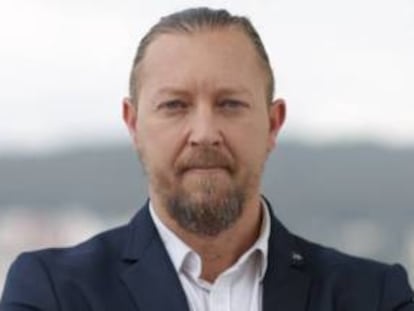Spaniard at center of Julian Assange spying accusations claims ambassador ordered espionage
David Morales told Spain’s High Court on Friday that Carlos Abad, who died in November, asked him to secretly record the WikiLeaks founder while he was staying in Ecuador’s embassy in London


David Morales, the owner of the Spanish security firm that spied on Julian Assange while he was living in the Ecuadorian embassy in London, testified in court on Friday that Ecuador’s former ambassador to the United Kingdom, the recently deceased Carlos Abad, asked him to record the cyberactivist’s conversations during his stay in the embassy. The former marine and director of UC Global S. L. testified last week before Judge José de la Mata of Spain’s High Court, the Audiencia Nacional. Despite overwhelming evidence of the espionage gathered during the legal investigation and already published by EL PAÍS, Morales denied before the judge that the spying was ever carried out.
Ambassador Abad was always uncomfortable with UC GlobalFidel Narváez, former secretary at Ecuadorian embassy in London
In his second court statement, this time made on his own request, Morales went from denying that the WikiLeaks founder was ever spied on, to admitting that he was asked to make the secret recordings. But he hid behind the former Ecuadorian ambassador, who died in November, and said it was Ecuador’s secret service, Senain, that hired his services during the presidency of Rafael Correa, who governed Ecuador from 2007 to 2017.
According to sources from Assange’s defense team, Morales claimed in court that his employees wrote reports on the cyberactivist’s visits and made records of their cellphones and computers following orders from Senain – not the US Central Intelligence Agency, as three protected witnesses have claimed in court testimony.
Although the security cameras at the embassy were recording audio from December 2017 onward, Morales presented an alleged email from Abad to the judge suggesting otherwise. In the message, which is dated January 27, 2018, the then-ambassador asks for a microphone to be installed in the embassy’s meeting room. The owner of UC Global said that he put the microphone in place as a test and later removed it. In 2018, as part of a labor-related lawsuit, Abad accused Morales and his lawyer of having forged his emails and signature.
Abad was removed from his post by the government of Ecuador’s incumbent president, Lenín Moreno, and died from lung cancer in November, Ecuador’s former ambassador to the European Union, Pablo Villagómez, confirmed to EL PAÍS.
Former Ecuadorian president Rafael Correa claims that he was also spied on by UC Global.
According to Fidel Narváez, who was then the first secretary of the Ecuadorian embassy and had a close relationship with Abad, the ambassador “was always uncomfortable with UC Global. I never saw him have the least bit of a relationship with Morales. I always suspected that the company was crossing a professional line,” he said.
Assange’s defense team, led by lawyer Aitor Martínez, questioned Morales’ version of events, asking how it was possible for Abad to have ordered the spying operation if he himself was recorded on one of the microphones, as heard in the audio recordings. The team also read out an email in which Morales asks for microphones to be placed throughout the Ecuadorian embassy, including in the ambassador’s office.
Recordings of secret services chief
“How do you explain that Senain ordered the spying operation in the embassy, when the audio of a meeting between Senain’s chief himself, Rommy Vallejo, and Assange was recorded?” Assange’s legal team asked Morales. The head of UC Global replied that Senain was divided before the change of government in Ecuador, when Lenín Moreno was elected president. On the numerous emails in which Morales told his workers that he was working for “an American client” and “playing in first division,” the former marine said that he wanted to motivate his staff and that Ecuador’s secret service had people in the United States.
Emails sent by Morales to workers also indicated that Ecuadorian diplomats were to be targeted in the spying operation. In these emails, he asked for the embassy’s phone directory, Wi-Fi password and even the thickness of the walls of Assange’s room – information which, according to Assange’s lawyers, the ambassador and the Ecuadorian secret service should have had.
Morales presented Judge De la Mata with a list of his trips to the United States, but according to Assange’s lawyers, left out his stays in Alexandria, a city in the US state of Virginia, close to Washington DC, where the US federal court is demanding Assange’s extradition to the United States.
Assange’s defense team asked Morales if Trojan horse malware was installed in phones belonging to one of the daughters of former Ecuadorian president, Rafael Correa. Morales replied that this was done at the request of the Ecuadorian presidency’s protection service. During Correa’s presidency, UC Global S.L. provided security services to the former leader’s daughters, who were studying in Europe at the time. When EL PAÍS revealed the evidence of the spying operation against Assange last June, Correa claimed that he too had been spied on by UC Global.
English version by Melissa Kitson.
Tu suscripción se está usando en otro dispositivo
¿Quieres añadir otro usuario a tu suscripción?
Si continúas leyendo en este dispositivo, no se podrá leer en el otro.
FlechaTu suscripción se está usando en otro dispositivo y solo puedes acceder a EL PAÍS desde un dispositivo a la vez.
Si quieres compartir tu cuenta, cambia tu suscripción a la modalidad Premium, así podrás añadir otro usuario. Cada uno accederá con su propia cuenta de email, lo que os permitirá personalizar vuestra experiencia en EL PAÍS.
¿Tienes una suscripción de empresa? Accede aquí para contratar más cuentas.
En el caso de no saber quién está usando tu cuenta, te recomendamos cambiar tu contraseña aquí.
Si decides continuar compartiendo tu cuenta, este mensaje se mostrará en tu dispositivo y en el de la otra persona que está usando tu cuenta de forma indefinida, afectando a tu experiencia de lectura. Puedes consultar aquí los términos y condiciones de la suscripción digital.








































